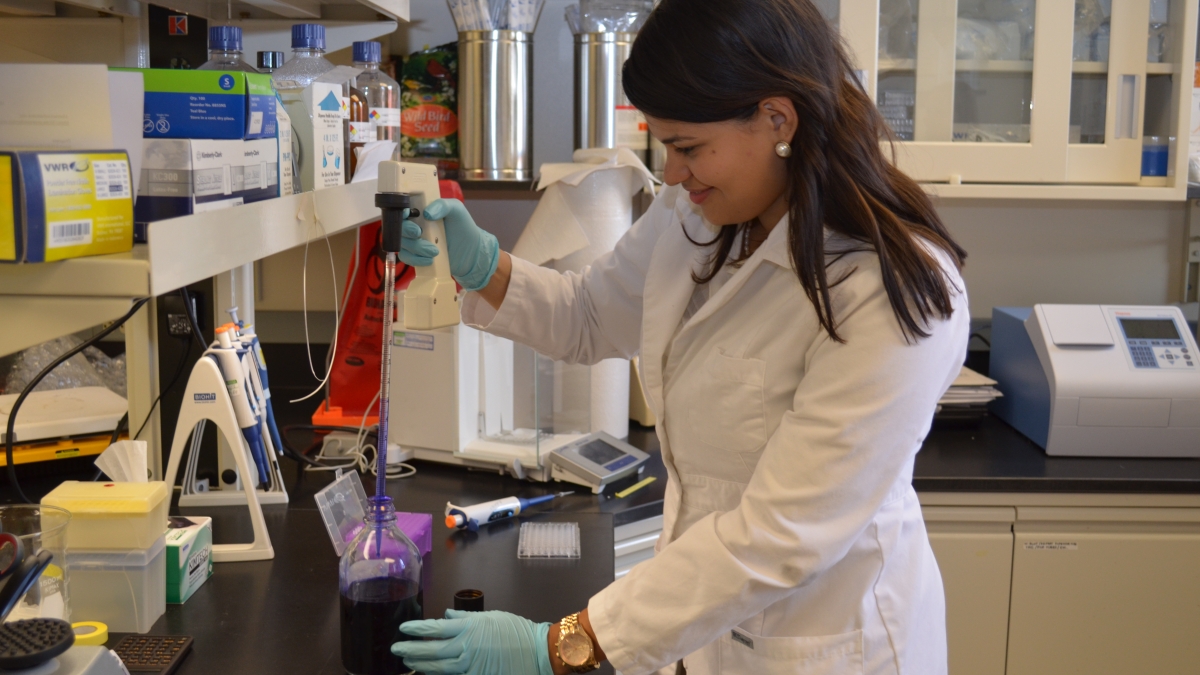Professor helps students advance health discoveries

While many classrooms sat quietly over the summer, there was a lab in the Life Sciences building at Arizona State University where students were busy engaging in research projects. Under the direction of Karen Sweazea, assistant professor in the School of Nutrition and Health Promotion and the School of Life Sciences, a team of graduate and undergraduate student researchers were advancing discoveries about the physiology of diabetes.
Sweazea, who came to ASU in 2008 following her post-doctoral fellowship in vascular physiology, is advancing a program of research spanning lower vertebrate animals to humans, exploring the vascular impact of diabetes.
“My goal is to improve the understanding of blood sugar and oxidative stress on the vasculature and learn from animal models to advance human health,” says Sweazea.
Teaching and mentorship go hand in hand
In addition to advancing her own program of research, Sweazea is a mentor and team leader to graduate and undergraduate students interested in basic science research.
In April, the American Physiological Society announced its Undergraduate Summer Research Fellowship awards for 24 students from across the nation. The program provides a summer stipend for a student to work with a faculty member from around the nation with the training and research lab matching with the student’s interests. As such, over the summer, Sweazea supervised a team of undergraduate students and one doctoral student in her lab.
“One of the many standout hallmarks of Sweazea’s time at ASU has been her engagement with, and mentoring of student researchers in her lab,” said Steven Hooker, associate director for research in the School of Nutrition and Health Promotion. “She has made a real impact on the lives of many students, as her work with the American Physiology Society matched funding allows students to come to ASU for the summer to support research.”
ASU junior Matthew Calhoun, recipient of the APS Undergraduate Research Fellow and biochemistry major, worked with Sweazea. Calhoun, who intends to go to medical school after finishing his undergraduate degree, is interested in the expression of glucose regulation hormones.
“It is a privilege to have a mentor like Dr. Sweazea; her motivation and unyielding support for her students promotes an exciting and innovative environment for everyone in the lab,” he said. “Dr. Sweazea is truly an amazing professor to have; her enthusiasm in her area of research has inspired me to continue my education in a similar field.”
The summer fellowship also funds his travel to the 2014 Experimental Biology Conference in San Diego to present data from his summer project.
Another award-winning student, Anna Simperova, an animal physiology and behavior major, minoring in family and human development, is funded through the School of Life Sciences Undergraduate Research (SOLUR) program. The Scottsdale junior plans to attend medical school after ASU to become a neonatologist.
Simperova’s work with Sweazea led to the discovery of a parasite in mourning doves which was previously thought to not infect the birds. She is also working on a diabetes-related project in collaboration with researchers at the Phoenix VA Health Care System exploring the impact of high fat diets and insulin resistance on vascular reactivity.
“I enjoy the intellectual challenge of taking what I learn in lecture and applying it to real-life situations,” Simperova said. “The field of science is constantly evolving and being able to contribute to that growth doing projects that spark my interest for biology and medicine is very gratifying.”
Student travels across the country to study under Sweazea
Katerine Diaz, originally from Venezuela, is a junior majoring in dietetics and nutrition at Florida International University and is funded through the Short Term Experience for Underrepresented Persons (STEP UP) program. She said she chose ASU for her summer research opportunity because of the reputation of the School of Nutrition and Health Promotion’s dietetics program, the second largest program in the country.
“After a few days in the lab, it quickly became apparent to me there were many techniques that require practice to perfect,” Diaz wrote in an article for Florida International University News. “Although there were moments of frustration, in the end I felt it was a valuable experience that will serve me well, not only in my undergraduate years, but also in my career.”
Sweazea’s current interdisciplinary work includes two grant proposals currently under review with faculty at the University of Arizona Phoenix campus looking at the risk for aging women and the impact of poor nutrition on heart disease.
Media contact: